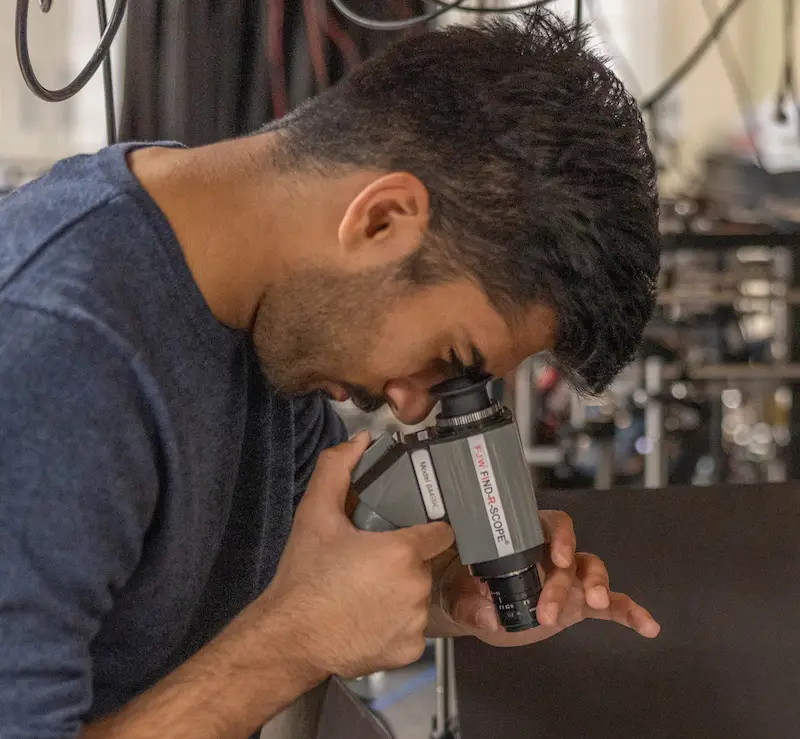Write all of the introduction content here. Only use NON
FULL-WIDTH block.
Full-Width blocks can be inserted
outside of this block and will wrap around the form. Form settings are located on page settings
(click
“Program” for page
settings in
right-hand sidebar.)
Write your contact information here and insert your embed form code in the Custom HTML block below
Preparing Engineers to Shape the Future of Academia and Industry
Miami University’s Ph.D. in Engineering is an interdisciplinary degree offered in collaboration between the College of Engineering and Computing (CEC) and the Department of Physics in the College of Arts and Science (CAS).
Ph.D. in Engineering students will choose a concentration in one of the following areas: Biomedical Engineering, Chemical Engineering, Electrical and Computer Engineering, Mechanical and Manufacturing Engineering, Robotics and Automation Engineering, or Engineering Physics.
Curriculum and Concentrations
As part of their coursework, Ph.D. in Engineering students will complete a minimum of 18 hours graduate coursework in their intended concentration. Students will also be required to enroll in one departmental graduate seminar each semester in their area of concentration.
Below are the six concentrations students can choose from.
- Biomedical Engineering
- Chemical Engineering
- Electrical and Computer Engineering
- Mechanical and Manufacturing Engineering
- Robotics and Automation Engineering
- Engineering Physics
Quick Facts
- 4-5 Years Expected Program Duration (full-time)
- Curriculum: Minimum 60 hours (with M.S.), or 90 hours (with B.S.)
- Application Deadlines: Feb. 1 for Fall semester, Oct. 1 for Spring semester
- Students must write and successfully defend a dissertation in their research area as part of their degree requirements.
Facts and Stats
Admission Requirements
- Admission requires either a bachelor’s degree, with a minimum 2.75 GPA (4.00 GPA U.S. Scale) (or equivalent), or a master’s degree, with a minimum 3.00 GPA (4.00 GPA U.S. Scale) (or equivalent), in engineering, physics, or a closely-related field.
- The Graduate Record Exam is recommended, but not required.
- Prior coursework must include college-level Calculus 1, Calculus 2, Linear Algebra, Differential Equations, statistics, a programming language and/or computational methods course, and discipline-specific courses appropriate to one of the Ph.D. concentration areas.
- Students whose native language is not English must demonstrate English proficiency with a minimum score of 80 for TOEFL, 6.5 for IELTS, 54 for PTE, or 110 for Duolingo.
- These requirements are consistent with the admission requirements for other Ph.D. programs at Miami University.
- Financial Aid: Limited graduate assistantships are available. Apply early for full consideration; available assistantships are more limited for spring starts.
Click on plus button at the bottom of this Accordion BLOCK (not accordion tab) to create a new tab. Select Accordion TAB block to edit tab headline. Select nested blocks within accordion tab to edit content.
-
By the time they graduate with a Ph.D. in Engineering from Miami University, students will have the ability to:
- Apply creativity and skill in design, analysis, and innovation to plan and execute original research leading to new knowledge and/or a novel solution to a complex problem (SLO 1).
- Demonstrate depth of knowledge in the dissertation concentration area (SLO 2).
- Communicate results of research effectively orally and in writing to both technical and non-technical audiences (SLO 3).
Meeting Societal Needs through Engineering
The Ph.D. in Engineering will require students to demonstrate the broader impact of their work toward meeting a societal need in one or more of the following co-curricular areas:
- An application to a problem facing industry in Ohio that provides an improvement to the quality or efficiency of a product or process.
- An entrepreneurial opportunity arising from a new product or process that can create new jobs in Ohio.
- An application to a social or humanitarian problem that improves the quality of life for people dealing with injuries, physical or mental health problems, natural disasters, access to adequate food, shelter, or clothing, clean air and water, etc.
- A pedagogical innovation that promotes learning and equips the graduate and others for teacher-scholar roles.
Additional Opportunities

Tiered Teacher Training
Ph.D. students interested in teaching will receive specialized training for teacher-scholar roles. Students can go on to earn the Graduate Certificate in College Teaching to advance their careers.

Access to Internships
Ph.D. students working on industry-related research can have access to internship opportunities. Graduate internships with industry are encouraged, but not required.

Research Clusters
Ph.D. students will have opportunities to work in a variety of cutting edge research areas including A.I. and High Performance Computing, Assistive and Sustainable Technologies, and Robotics, Automation and Manufacturing.
Lab Spaces and Research Environments
Select offices, laboratories, and equipment in Kreger, Garland, and Hughes Halls, the McVey Data Science Building, the Engineering Building, and Benton Hall (including the first-of-its kind SMART Factory Innovation and Technology Lab featured in the video below) will be available for Ph.D. of Engineering students to research and engage in.
Admission and Funding
This is Where Your Journey to Miami University Begins
Explore what it means to be a graduate student at Miami University, where students prepare to go anywhere and everywhere. We’ll be here to help every step of the way as you prepare for college admission, enrollment, and success.
Contact Us
Graduate Admission
513-529-GRAD (4723)
[email protected]
College of Engineering and Computing
Marnie M. Saunders
Benton Hall 205B
Oxford, OH 45056
513-529-0792
[email protected]


